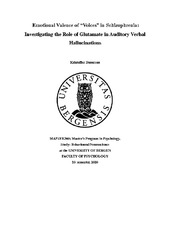Emotional Valence of "Voices": Investigating the Role of Glutamate in Auditory Verbal Hallucinations
Master thesis
Permanent lenke
https://hdl.handle.net/1956/22914Utgivelsesdato
2020-06-23Metadata
Vis full innførselSamlinger
Sammendrag
Background: Recent research seems to point towards a prominent role of glutamate in auditory verbal hallucinations in schizophrenia, with complex inter-related pathophysiological processes and mechanisms involving hyper- and hypo-activity at several fronto-temporal brain regions. However, there seems to be significant variability within and between such mechanisms, clinical responsiveness to pharmacological intervention and phenomenological aspects of hallucinations. It has been suggested that inter-individual variability in symptoms (i.e. phenomenological aspects of hallucinations) could infer differences in underlying psychopathology, however, this remains to be tested. This thesis therefore seeks to investigate emotional valence of auditory verbal hallucinations in schizophrenia and the extent to which they relate to glutamate and response to (dopaminergic) antipsychotic medications. Methods: This project is based on an existing dataset containing Glx (glutamate+glutamine) estimations from four fronto-temporal brain regions obtained using magnetic resonance spectroscopy, recorded from 40 schizophrenia patients with auditory verbal hallucinations. Clinical responsiveness was measured with the Positive and Negative Symptoms Scale, and emotional valence was measured using the Revised Beliefs about Voices Questionnaire. Results: There was significant correlations for Glx levels and emotional valence across all regions. Positive emotional valence was found positively correlated with Glx levels, whereas a negative correlation was found for negative emotional valence. There was no significant correlations between clinical responsiveness and emotional valence. Discussion and conclusion: Results suggest that glutamate may have an important role in the emotional valence of “voices” in schizophrenia. It can be speculated that positive and negative emotional valence of “voices” reflect sub-groups with different underlying glutamatergic psychopathology.
